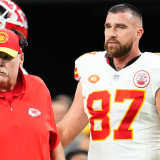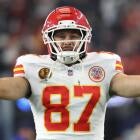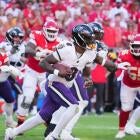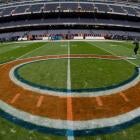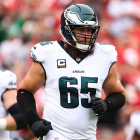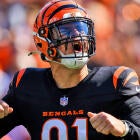Counterpoint: The Dallas Cowboys will return to the playoffs next year
The Cowboys don't have to match last season's 12 wins to head back to the postseason. Given their easier-than-you-think schedule and defensive upgrades, getting back won't be quite as hard as it sounds.
Sometimes we argue about things at CBSSports.com. For instance, whether the Cowboys will make the postseason next year. Will Brinson argues why the Cowboys will fall short here.
The Cowboys appearing in last year's playoffs was a bit of a shock to most people, myself included. The consensus opinion of the Cowboys coming into the year was that despite a bunch of firepower on the offensive side of the football, they simply would not be able to compete defensively, and thus they'd lose a heck of a lot more than they won. That was a pretty safe bet, considering the makeup of the roster and the fact that they'd lost the three best players (DeMarcus Ware and Jay Ratliff to other teams; Sean Lee to injury) from one of the worst defenses of all time.
But things didn't exactly work out that way. The Dallas offense was explosive, as expected, but the defense wasn't nearly as bad we all thought it'd be. In fact, it was downright competent for much of the season. Despite working with a group mostly consisting of cast-offs and has-beens, defensive coordinator Rod Marinelli managed to coax the 15th-ranked scoring defense out of his charges.
The Cowboys ran over, through and around opponents, controlling the ball and the clock more than every other team in the league. That helped the defense stay off the field, helping hide the relative lack of talent – the Dallas defense faced 116 fewer plays in 2014 than in 2013, the largest decrease in all of football.
One of the pillars of that strategy – running back DeMarco Murray, last season's leading rusher – is no longer with the team, having left for the rival Philadelphia Eagles during the offseason. It follows logically, then, that the Cowboys won't be able to replicate last season's success, and they'll be making tee times and booking cruises come January when the playoffs roll around. Right?
Well, maybe not. I'm about to go all 8 Mile on Will Brinson, shooting down his (probable) arguments for why the Cowboys won't make the playoffs, one by one.
They're playing a first-place schedule
Counterpoint: The Cowboys won the NFC East last season, which means they'll presumably face a tougher schedule next season than they did last year. Here's the thing: their schedule still isn't all that difficult.
Despite dates against the (possibly Tom Brady-less) Patriots, Seahawks and Packers (arguably the three best teams in the NFL), the Cowboys have only the 24th-toughest slate of games next season, per calculations done by Grantland's Bill Barnwell. That's actually easier than each of the three other teams in the division.
If you want to go by Pythagorean Winning Percentage (what record teams should have had based on their point differential, which is historically a better indicator of a team's quality than its actual record) rather than wnloss record, the Cowboys' schedule still only ranks as the 21st-hardest in football. And if you use Las Vegas odds to calculate strength of schedule, the Cowboys still face a below-average slate; it's the 17th-toughest in the NFL.

They were ridiculously healthy last year
Counterpoint: On offense, this is certainly true. By Football Outsiders' Adjusted Games Lost, the Dallas offense was the second healthiest in the whole league last season.
Murray stayed healthy (for the most part) all year. None of the wide receivers or tight ends missed a game. Tony Romo only missed one game and part of another. And the five starters along the offensive line – Tyron Smith, Ronald Leary, Travis Frederick, Zack Martin and Doug Free – played 91.3 percent of all offensive line snaps.

But the pillars of that line – Smith, Frederick and Martin, each of whom was named to an All-Pro team – are guys that have stayed remarkably healthy for years on end. Smith has missed one game in four NFL seasons. Frederick has played all 32 games of his NFL career and hasn't missed more than two games in a year since he was a freshman at Wisconsin. Aside from when he red-shirted as a freshman at Notre Dame, Martin hasn't sat a game since high school. Not everyone can play every single game, of course, but expecting those specific guys to get injured is largely betting against history.
The other two members of the line are the ones with injury issues, but they also happen to be the most replaceable.
Leary has a degenerative knee condition that caused him to go undrafted a few years back, but he's played 31 of 32 games the last two seasons. He missed a game last year, and backup Mackenzy Bernadeau stepped in without incident. The new backup is La'el Collins, who might have been a first-round pick were it not for his ex-girlfriend being killed in the lead-up to the draft (Collins was never considered a suspect, but police wanted to question him).
Free missed three games in the middle of the season with a sprained foot, and then the final four games (two of which were playoff games) with a broken ankle. Jeremy Parnell, who has since departed for Jacksonville, filled in for those games and performed admirably, with the offense not really missing a beat. Parnell is gone, but the Cowboys have three options at the swing tackle position in third-year man Darrion Weems as well as this year's draft picks Chaz Green and Laurence Gibson.
As for Romo, I'm not sure why he's considered some massive health risk at this point. He's played an average of 15.5 games over the last four years, and he's only missed more than three games in a single season once in his career. He had back surgery last offseason, but he looked remarkably healthy all year. (Yes, I am currently knocking on all the wooden surfaces in my apartment after writing the preceding six paragraphs.)
Meanwhile, it would be tough for the Cowboys' defense to have worse health than it did last season. Per Adjusted Games Lost, the Cowboys had the 28th-healthiest defense last season.
Sean Lee, arguably the team's best defensive player, missed the entire season. Starting corner Morris Claiborne was lost for the season after four games (though some would argue that amounted to addition by subtraction, especially after he wound up getting benched for the far superior Orlando Scandrick, who himself missed two games due to a molly-related suspension). Second-round pass-rusher DeMarcus Lawrence missed the first nine games with a broken foot. Justin Durant missed 10 games due to various injuries. Bruce Carter and Rolando McClain sat three games each.

Defensive regression is coming
Counterpoint: The Cowboys led the league in defensive turnover percentage last season, taking the ball away from the opposition on 16.8 percent of drives. Regression is likely coming.
But maybe not all that much regression. In 2013, even while being one of the worst defenses in football history, the Cowboys forced turnovers on 13.8 percent of opponent drives, the 10th-best figure in the league. Rod Marinelli defenses have always excelled at forcing turnovers, going back to when he was with the Bears and even the Buccaneers.
And any expected turnover regression should be offset by the talent upgrades made to the defense, particularly along the line. This is a team that gave 1,028 defensive end snaps to the combination of George Selvie, Anthony Spencer, Lavar Edwards and Jack Crawford last season – snaps that will now be divvied up between Lawrence, Randy Gregory and Greg Hardy, once the latter returns from his four-game (at most) suspension. The top defensive end from last year's roster – Jeremy Mincey – is likely fourth on this year's depth chart when everyone is healthy and active.
The presence of those players allows Tyrone Crawford to play the entire season at defensive tackle, where he shined for much of last season. And on passing downs, opponents have a Lawrence–Hardy–Crawford–Gregory foursome to look forward to. Needless to say, Dallas' pass rush should be much improved from the group that ranked 29th in Adjusted Sack Rate last season.
Add in a presumably healthy Lee; a full season from last year's fourth round pick Anthony Hitchens; however many games they get out of McClain after his suspension; additional linebacker depth in the form of Jasper Brinkley, Andrew Gachkar and this year's fourth round pick Damien Wilson; and a huge secondary upgrade in first-rounder Byron Jones, and it's not a stretch to imagine the Cowboys defense being a pretty significant upgrade on last year's group.
They can't replace DeMarco Murray with Joseph Randle, Darren McFadden and Lance Dunbar
Counterpoint: This one's definitely true. None of the backs on the Dallas roster is as talented as Murray, and none of them is likely to run for 1,800-plus yards next season.
But the Cowboys don't need them to. They're not trying to replace Murray with this group; they're just trying to approximate 75 to 80 percent of his production for around 10 percent of the cost.
The explosion of the Dallas run game last season was less about Murray reaching some new level of greatness than it was about the team simply staying committed to the run. The Cowboys as a whole averaged 4.6 yards per carry in 2014. They averaged 4.5 per carry in 2013. The difference is they ran the ball 508 times as opposed to 336.
Much of that had to do with how much confidence they had in Murray's ability to plow into and through the line time after time, but it was also about a confidence in the offensive line and the style of football they wanted to play. Murray's success was not all due to the line – nobody is crazy enough to argue that. But that group certainly helped, just as they'll help the combination of Randle, McFadden and Dunbar.
The Cowboys ran the ball approximately 80 more times than the league average NFL team last season. If you make those carries vanish and take away 360 rushing yards from their yearly total (80 rushes times 4.5 yards per rush), they still would have finished with the ninth-most rushing yards in the league. Even if they run the ball less often, they should still have a pretty solid rushing attack.
The statistical case
Now that we've gone through Brinson's probable arguments, allow me to present one of my own: the Cowboys don't even need to be as good or better than they were last year in order to make the playoffs. In fact, you could knock two wins off their 2014 total and they'd still be more likely than not to get in.
Let's stipulate two things:
- Since 2000, the average 6-seed in the NFC playoffs has finished with 9.8 wins
- Only five of 77 NFC teams to win 10-plus games since 2000 missed the playoffs
The Cowboys won 12 games last year, but they had the point differential of a team that would be expected to win 10.2 games. According to research done by Bill Barnwell, teams that outperform their Pythagorean Expectation by 1.5 to 2 wins in a given season have regressed, on average, by 1.8 wins the following year. If the Cowboys do that, they'll wind up with... 10.2 wins, comfortably in the playoff mix.
The Cowboys won eight games in 2013, which means they improved by four games in the 2014 season. Since 2000, there have been 31 teams that won exactly four more games than they did the year before. In the following season, that group of 31 teams regressed by an average of 1.2 wins, which would put the Cowboys at 10.8 for next year, once again comfortably in the playoff mix.


